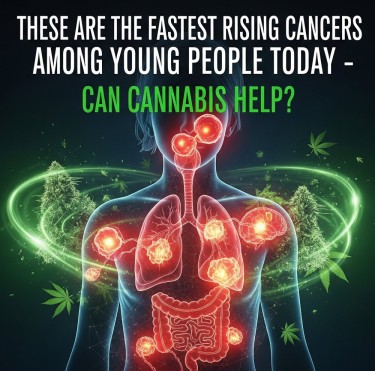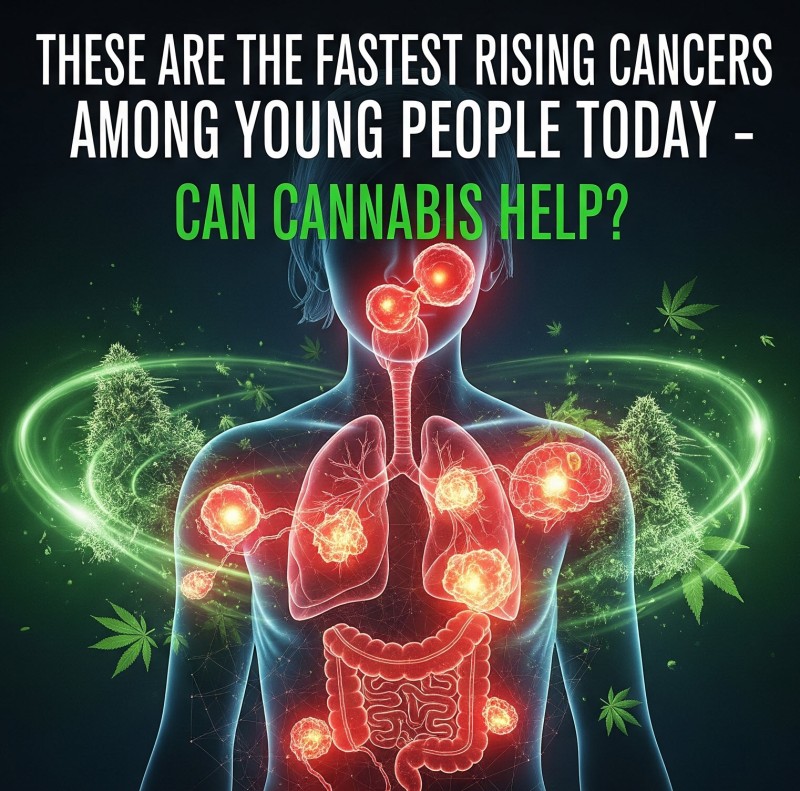
Fast Facts: These Are The Fastest Rising Cancers Among Young People Today
How Cannabis Helps Prevent And Treat Them
For much of the 20th century, cancer was viewed as a disease of the aging population.
We knew that cancer risks accummulated over time, and that risks multiplied or decreased based on one’s lifestyle, genetic mutations, and environmental exposures, to name a few. While it did affect younger populations, it was rare for cancer to affect individuals in their 20’s, 30’s and even 40’s.
But sometime in the 2000s, early onset cancers became much more prevalent around the world. We gradually observed that cancer was hitting more people under the age of 50. According to a study conducted by the National Institutes of Health (NIH), from 2010 to 2019, the rates for 14 types of cancer has skyrocketed for people under 50: these include breast cancer, kidney, colorectal, pancreatic, and lymphomas - and continues to do so. According to studies, the rates of early onset cancer continues to grow 1 to 2% a year in the US.
Why is this Happening?
There are many reasons why this is happening. But researchers for the NIH study chime in: “The causes of these incidences are likely to be cancer specific, including cancer risk factors becoming more common at younger ages, changes in cancer screenign or detection, and updates to clinical diagnosis or coding of cancers,” they wrote.
The same study also noted that while there was a significant rise among 14 types of cancer, the good news was that there was a decrease of incidences among 19 other types of cancer. As a result, the mortality rate isn’t rising. However, being diagnosed with cancer is not something anyone can take lightly: it’s a genuinely scary diagnosis that can cause serious financial and emotional strain.
Based on data and studies from the Memorial Sloan Kettering Cancer Center (MSK), obesity, increased consumption of processed food, and a sedentary lifestyle are contributors to the increase in cancer rates. Alcohol use has also been found to contribute to cancer risk, as well as exposure to toxins and pollutants in the environment.
Which Cancers Are More Prevalent These Days - And How Cannabis Helps
Integrating responsible cannabis use, together with a healthy lifestyle, can reduce the risk of developing these common cancers.
In April 2025, the results of the biggest study ever to investigate the effect of medical marijuana for cancer found that there is incredible support from the scientific community surrounding the plant’s ability to treat the symptoms of cancer. It’s important to note that the review carefully reviewed over 10,000 studies of cannabis and cancer, and they found overwhelming evidence that it can be used for treating inflammation, nausea, and appetite loss. Furthermore, they found evidence that it can fight cancer by inducing apoptosis and preventing cancer cell spread.
On that note, these are the leading causes of cancer among young adults today - and how cannabis can help:
-
Colorectal cancers: Cancers of the colon and rectum have been rising consistently among adults ages 20 and up. It’s the 3rd most commonly diagnosed cancer in the United States affecting both men and women.
According to a study out of Naples, Italy, administering CBG (cannabigerol), a non-psychoactive cannabinoid, was found to be effective in reducing cancerous tumor growth. For the study, Italian investigators from the University of Naples analyzed the impact of CBG on tumors of the colon, in vivo and in vitro. They found that CBG was beneficial in inducing cancer cell death, a process called apoptosis.
“Our data shows that the non-psychotropic cannabis ingredient cannabigerol inhibits the growth of colorectal cancer cells… and hinders the development and growth of colon carcinogenesis in vivo,” the researchers wrote. “We hypothesize that CBG may be a promising anti-colorectal therapeutic agent, both for prevention and as a curative medicine,” they said.
-
Breast cancer: Breast cancer is still the most cancer affecting young women globally. According to Harvard Medical School, breast cancer rates have been increasing one percent annually from 2012 to 2021 in the United States, though they have noticed more dramatic increases among women under the age of 50.
While we need more studies looking at cannabis for breast cancer, there have been a few promising results. One of these was conducted by Amy de la Harpe, a Mandela University PhD graduate of biochemistry. In her thesis, she studied the molecular mechanisms of cannabinoid-induced paraptosis, and found that cannabinoids were effective in inducing breast cancer cell death.
-
Pancreatic cancer: Generally speaking, pancreatic cancer is rare, though there has been a stark increase among incidences in young adults. It is also an aggressive cancer, and one that is difficult to detect early.
According to investigators from the Dana-Farber Cancer Institute at Harvard University, together with researchers from the University of Massachusetts, a non-psychoactive derivative of marijuana called the FBL-03G was effective in inducing apoptosis and inhibiting cancer cell spread. “The FBL-03G result reveal a new potential non-cannabinoid cannabis derivative with major potential for consideration in further investigations in the treatment of pancreatic cancer, where new therapy options are urgently needed,” they wrote.
-
Stomach cancer: Stomach, or gastric cancer rates are increasing among young adults under 50 in the United States.
There have been few studies proving that cannabis can treat and prevent gastric cancer, but one in particular discusses how CBD may have a powerful potential in inhibiting the proliferation of gastric cancer cells and induce apoptosis.
Conclusion
Cannabis should not be viewed as a one-size, fits-all solution when it comes to cancer. It is also not a replacement for conventional cancer therapies such as chemotherapy and radiation, though cannabis can support these therapies to improve the patient’s chance of survival and success.
At the end of the day, cannabis, when consumed responsibly, can be a powerful tool to aid patients in their physical as well as emotional journey to surviving cancer. Most importantly, when cancer is used a part of a healthy lifestyle alongside regular exercise, good sleep hygiene, a balanced diet and reduced stress, the risk for developing cancer in the long run is greatly reduced.






